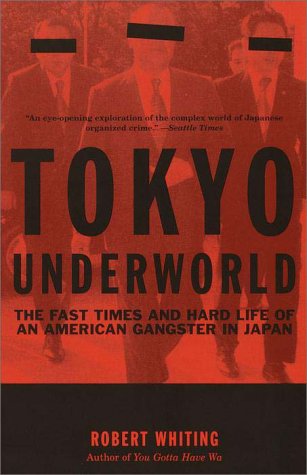
I've spent time in a few countries around Asia, but never Japan. In my life I've probably met less than 5 Japanese friends, so studying the language didn't really appeal to me. I studied Mandarin early on and ended up working in China, and I've always been clueless about the combination of classic and quirky in the Land of Rising Sun.
So the first Japan book is all about the Yakuza, rather than Hello Kitty.
Okay, okay, let me be clear, I'm not going to make any generalizations based on a book about crimelords. This is a really fun interesting book, not gruesome or overly violent as you might expect (seedy at times, devoid of morality, perhaps), and just a fun way to get into a totally foreign culture (apart from Sushi, Slam Dunk comics, and the Karate Kid movies).
At the outset of the book, I was pretty excited to learn of Japanese History right after the Second World War. What followed WW2 remains the most amazing Economic turnaround in history.
How long did it take the Mob to recover? It turns out that within 3 days of the American Treaty, the Gangsters were already in action in the Shinjuku, Tokyo and what follows is 300 pages of a crude, crass, corrupt and cold blooded account of those who survived and thrived there.
The book follows an American GI with balls of steel ( tough talkin' Italian New Yorker named Nick Zappetti) who gets in early for the booming Japanese recovery, builds an Italian restaurant Empire and has to fend off would be conquerers.
The whole story is about, brace yourself, bribes. Bribes, bribes and more bribes (in that sense it was very educational!). Everything good that happens in this account is a long chain of payouts under the table, and of course, the anti-Americanism builds throughout the book as the Japanese economy roars back to life (with confidence, the locals grow weary of the Westerners).
We follow a cast of gangsters, grifters, wannabes, and of course, hookers. But while almost everyone in the book is what you might call 'a bad seed' the inner working of business (which goes all the way up to the Japanese political structure and American espionage) are amazing. Much of it was reminiscent of Perkins "Economic Hit Men" but with all the delicacy and stubbornness of Japanese 'Wa' (meant to maintain harmony amongst all things). Ultimately that was the most provocative part of the book: not the hellish violence, or immature cavorting of multimillionaires, but the way Japanese maintained 'face' and their own sense of Japanese integrity, amidst a modernizing and ever more international environment.
The book closes wistfully as we say goodbye to the great Nick Zappetti, a foreigner who's seen the best and the worst Japan has to offer.




4 comments:
I'm your big fans~~haha~~You always read so fast~~Though the economics topic is hard for me, I still feel learnt a lot when I finished. But I don't agree with that "bribe" will be the best way to solve all the problem.
BTW,It's really funny when I looked up the word "Yazuka" from the dictionary online, it showed the meaning:日本瘪三...Quite funny~~~
By the way, the word Yakuza, doesn't actually mean anything cool like, 'Dark Society' or 'The Family' or anything. It actually came from a Card Game kids used to play: Ya (8) Ku (9) Za(3) is a losing hand in a card game called Bakuto.
Originally being called a Yakuza meant you were a scoundrel, waste, loser, bad person. Eventually the name caught on and the thieves started calling themselves Yakuza with pride ;)
haha,learnt from you again~~~
Though I have learnt Japanese for several month, it seems yours is better than mine~~
Post a Comment